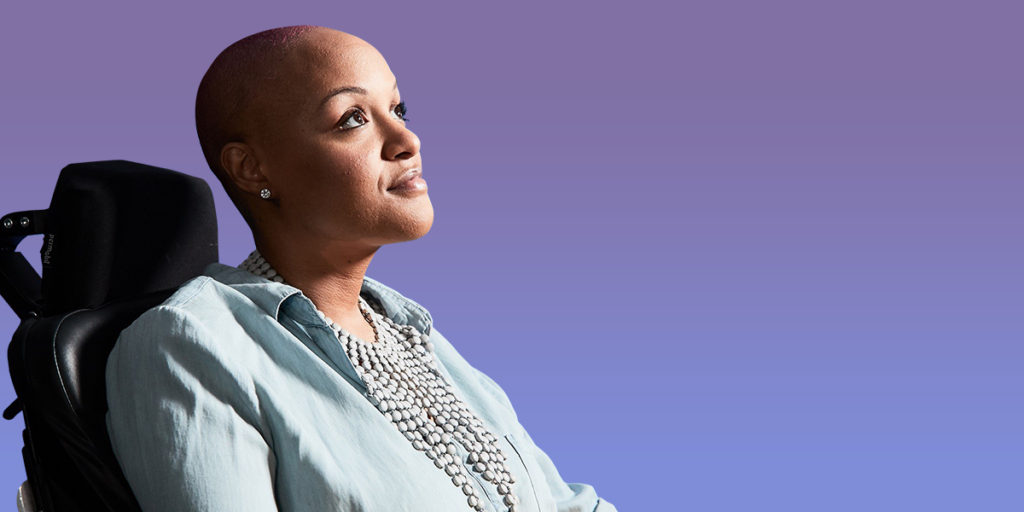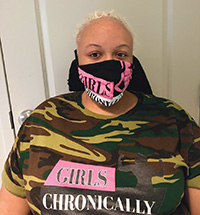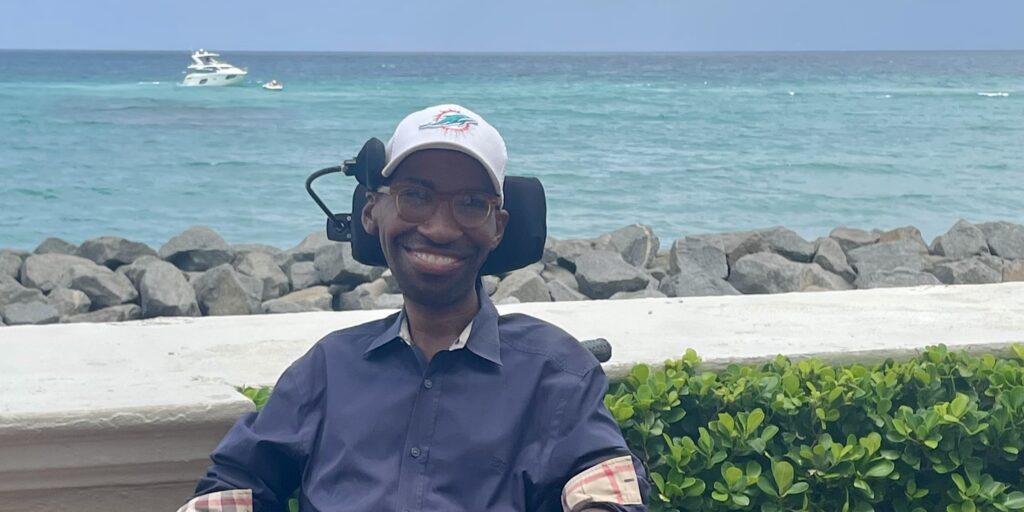
Business Unusual
By Keisha Greaves | Friday, December 4, 2020
Over the summer, I wished I could go to the movies, enjoy a meal out with friends, and explore the latest fashions at my favorite malls. Instead, I didn’t go any farther than the parking lot outside my apartment building.
But, honestly, I wasn’t brought down by sheltering in place. I’m really a homebody, and I’ve worked hard to make my home my sanctuary. Also, in some ways, the COVID-19 pandemic ended up being a blessing in disguise.
A passion for fashion
I am the founder of Girls Chronically Rock (girlschronicallyrock.com), a clothing company I created in 2017 to help inspire and motivate others in the disability community.
I was diagnosed with limb-girdle muscular dystrophy (LGMD) in 2011, and after hearing those words, I was not sure what the future held for me, or if I was going to be able to pursue my dreams.
At the time, I was working as a merchandise coordinator for department stores such as Macy’s, Target, and Nordstrom. I’ve always had a passion for fashion, but I was on my feet a lot, and it took a toll on my body as my LGMD progressed.
When it became harder to move freely, I asked my employer to let me work from home. I was stunned that my employer did not want to accommodate me after I had been working for them for years. Despite my drive and expertise, they made me feel like I was not good enough.
Pursuing my dreams
I am a true believer that things happen for a reason. That’s why Girls Chronically Rock was born.
I knew I wanted to start my own fashion line with the word “chronic” in it, for “chronic illness.” I was lying in bed one night, and I thought, “Girls chronically rock.” That was it! I loved the way it sounded, and I ran with it. As I launched a collection of T-shirts with inspirational quotes, I also began speaking publicly to help others in the disability community.

Keisha’s business took off when she began making face masks out of T-shirts in her collection.
Right before the pandemic, I visited my alma mater, Framingham State University, to speak to students about adaptive fashion. The audience was all smiles, and I left with a feeling of honor for serving my community and a customized, framed Girls Chronically Rock poster from the school. It was a powerful keepsake that was hanging in the very cafeteria that I used to eat in as a student — and I got to take it home and put it on my wall.
Unexpected changes
I had no way of knowing that would be my last in-person speaking engagement for a long time. The pandemic brought lots of unexpected changes. The first couple months of the shut-down impacted Girls Chronically Rock. Orders slowed. Collaborative projects dissipated. I wasn’t sure what was to become of my health or the business that I had poured so much of my blood, sweat, and tears into.
I expected nothing less; the entire world was in crisis with loss of lives, loss of family members, and loss of jobs. I almost felt terrible marketing my business, asking people to spend money on my merchandise. It felt like a lose-lose situation.
Then, around the end of April, my big moment arrived. I thought, “Why not create face masks out of some of the T-shirts I have in inventory?”
I also started a podcast to express my feelings about what’s going on in the world with the COVID-19 pandemic and the Black Lives Matter movement. I created T-shirts that say “Black, Disabled Lives Matter” and other quotes related to our community and current events.
This allowed me to be in touch with the community and show support and love from inside my apartment. And customers really liked the new designs. Sales resumed, and then started to take off.
The silver lining
Since the world has gone digital, I’ve had more opportunities to grow and expand my brand. It can be difficult for me to get to in-person events because I use a wheelchair and don’t have an accessible vehicle. Plus, in the midst of the COVID-19 pandemic, I’m at higher risk because of respiratory problems caused by my LGMD.
Coronavirus created a digital world where everyone could host video conferences and webinars. I was able to participate in many more events than I had before the pandemic began. In fact, since the quarantine began, I’ve spoken to the students at Partners for Youth with Disabilities and at the NORD Rare Disease and Orphan Products Breakthrough Summit, Think in Color Summit, and Fearless Women’s Summit. The opportunities truly have been amazing, and I am grateful that these organizations gave me the opportunity to share my story and bring awareness about the disability community, LGMD, and my business.
For the longest time, even before the birth of Girls Chronically Rock, I fought for more accessible work opportunities for those of us with disabilities. Now, I feel like I’m winning in a battle that had felt unwinnable. Coronavirus made that possible for me — and many folks out there like me.
This is something people in the disability community have wanted for a long time — to work remotely and have accommodations when needed. There is no way the world can force people with disabilities to go back to inaccessible workplaces when we’ve seen that almost everything can be done from home easily.
Looking ahead
I hope to see a vaccine for COVID-19 very soon. I pray for happiness, success, comfort, and recovery for everybody affected by the pandemic.
But, even after things get back to normal, I want people to have the option to work remotely and attend an event online. I want us to have choices. I want us to be heard, accepted, and achieve anything we want.
From where I sit, coronavirus has given me the freedom to be the powerhouse I always wanted to be. Truly an unexpected blessing, indeed.
Keisha Greaves, 34, lives in Cambridge, Mass. She is a writer, advocate, fashion designer, and business owner. You can find her @girlschronical1 on Twitter, @KeishaGreaves on Facebook, @girlschronically_rock on Instagram, and you can check out her clothing at girlschronicallyrock.com.
TAGS: COVID-19, Employment, From Where I Sit
TYPE: Featured Article
Disclaimer: No content on this site should ever be used as a substitute for direct medical advice from your doctor or other qualified clinician.




